To register, you must be a NAMA member. If you are a current PPMS member, you can get a $5 discount on your NAMA membership.
Join NAMA here:
https://namyco.org/join.php
https://mms.namyco.org/members/evr/reg_event.php?orgcode=NAMA&evid=26210357
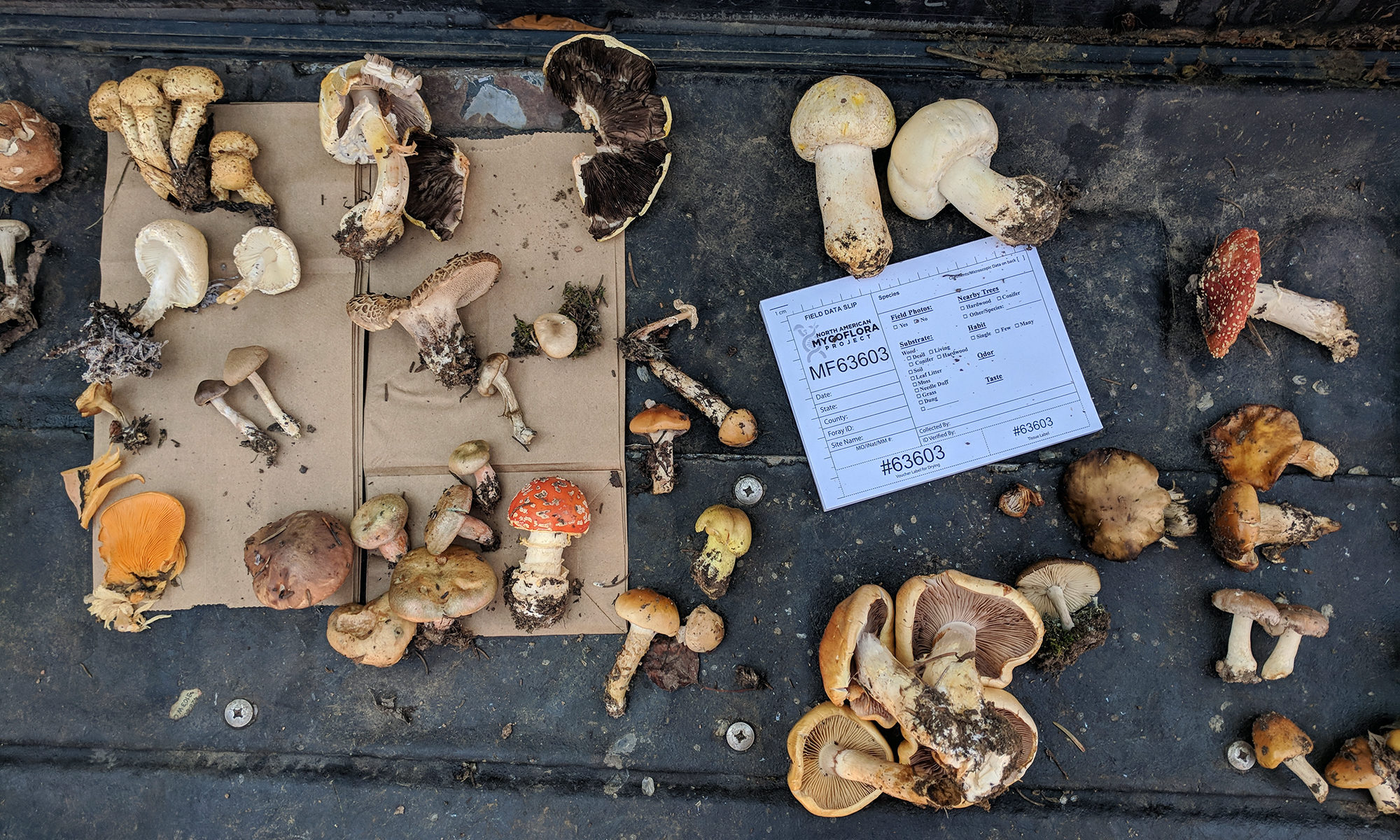
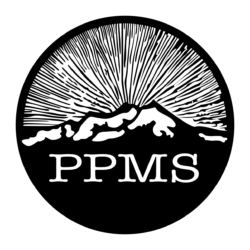
Pikes Peak Mycological Society
Promoting better understanding of mycology in Southern Colorado
To register, you must be a NAMA member. If you are a current PPMS member, you can get a $5 discount on your NAMA membership.
Join NAMA here:
https://namyco.org/join.php
The Pikes Peak Mycological Society is pleased to have the opportunity to host Jim Alderink, Chief Product Officer of MycoTechnology, a food ingredient company focused on harnessing the power of mushrooms and the intelligence of nature.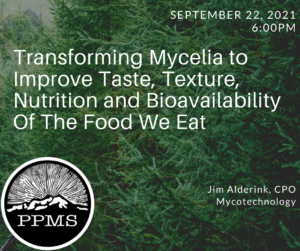
MycoTechnology is a Denver based start up that creates products that solve the biggest challenges in the food industry, like creating great tasting products without excessive sugar, salt, or fat and by doing it in a more sustainable way.
Alderink will present “Leveraging Mushrooms To Improve Taste, Texture, Nutrition and Bioavailability Of The Food We Eat” on September 22 at 6:00pm, in person, at the Bear Creek Nature Center in Colorado Springs. He will be handing out free samples to all who attend, as well as recipes for you to try at home.
This event is free and open to the public, however seating is limited and is based on a first come, first-served basis. Unfortunately, we are unable to take reservations at this time.
To learn more about Mycotechnology and Jim Alderink, visit www.mycoiq.com
Trent Blizzard to Discuss Burn Morels in Colorado following the 2020 Fires
Self proclaimed “modern forager” Trent Blizzard resides in Glenwood
Springs, Colorado. He has been trekking the forests of Colorado, the Midwest and the Pacific Northwest for years mostly with wild, edible mushrooms in mind. At first a hobby, the hunt for mushrooms quickly became nothing short of an obsession. Trent is a certified Wild Mushroom Identification Expert in Colorado. As a modern forager, he utilizes digital mapping, social media, GPS, phone apps, and even satellite internet while on the road. You will find lots of info about his foraging adventures with his wife, Kristen, at modernforager.com.
Trent and Kristen Blizzard are the authors of Wild Mushrooms: A Cookbook and Foraging Guide. Whether you are a seasoned forager or new to the wild and wonderful word of edible forest fungi, this book has something for you! You will find a wealth of tips and tricks for harvesting each mushroom, along with general cooking techniques and preservation methods. They endeavor to explore not only a selection of delicious cuisine and new methods of cooking these wild edibles, but the question of how to preserve and enjoy your harvests all year long. The book is also a celebration of people they have met over the years. Order yours today!
Trent and Kristen will be presenting on May 26 at 6:00pm. This speaking event is free and open to the public. Join us via Youtube and prepare for a great time!
Pikes Peak Mycological Society is please to welcome Olga Tzogas on October 21, 2020 for her presentation on:
The Love + Power of Medicinal Mushrooms
Together we navigate the complex web and ancient world of medicinal mushrooms. Explore how they grow in nature then, how they nurture us in return. Explore the deep history humans have with medicinal mushrooms and their power to heal and identify uses and ways to prepare them. We will demonstrate the vast options and diversity of properties within just a handful of selected varieties. The most common and popular we will look at & work with is the Reishi or Lingzhi mushroom, the legendary ‘Mushroom of Immortality.’
Journey through other divine healers in the wild, the Turkey Tail mushroom, Lion’s Mane mushroom, and the common culinary mushroom, the Shiitake. Learn about how each of these mushrooms exists in nature, how we can cultivate a working relationship with them in our health regimens and of course keep them sacred and wild where they deserve to remain. Raising awareness of the growing market for these healers and what it means for us to do our part to grow our own, explore the ethics of this huge growing industry.
Olga Tzogas, a native of Greece, created and operates Smugtown Mushrooms in Rochester, NY. Her journey with fungi and plants began over ten years ago. She has been with these allies by foraging in both urban and wild settings, while developing skills to identify food and medicine in both environments.
Smugtown Mushrooms was established in 2011 based on a need for mushrooms and mushroom growing supplies, workshops, events and community-based science in her local community. She is continuously learning and embracing the never-ending potential of mushrooms and the wonderful world of fungi.
Olga teaches workshops throughout the world about wild mushroom identification, medicinal mushrooms, biology and mushroom cultivation. She was a core organizer for the Radical Mycology Convergence and the MycoSymbiotics Festival from 2015-17, and helped to establish the first ever New Moon Mycology Summit in 2018. Olga returns to her native country annually to offer mushroom- and plant-focused tours.
Wednesday, October 21, 2020
at 6:00 pm
Live on Youtube
“How to correctly collect and voucher fungi so your encounter is meaningful to science” by Giuliana Furci for the August, 2020 PPMS meeting.
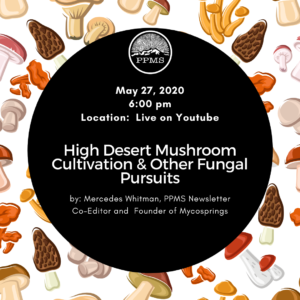
Mercedes Whitman will be presenting High Desert Mushroom Cultivation &Other Fungal Pursuits. She’ll talk about the challenges unique to the high desert of the Southwest and how mushroom cultivation and working with fungi for applications such as building soil health, water retention, erosion control and remediation can help address them.
Progressively unpredictable weather patterns and more intense, but less frequent, rains are regular challenges in the Southwest, and increasingly so worldwide with climate change. The practices she will demonstrate can be applied anywhere, from entire cities, forest and grassland preserves and even your own backyard.
Designing microclimates that support fungal growth, makes for more social and ecological resilience. Water catchment and placement, mulching, passive hoop house syst
ems, and using native and climate relevant species, are feasible and cost effective ways of cultivating mushrooms consistently, and using fungi for the overall well being of our lands and ourselves.
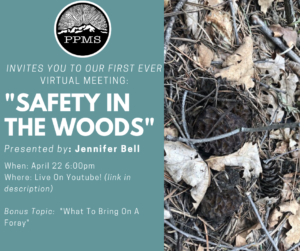
The Pikes Peak Mycological Society will host our first ever remote meeting, broadcast live on Youtube on April 22, 2020 at 6:00 p.m. Everyone is welcome to join!
Our club VP, Jennifer Bell, will be discussing “Safety In The Woods” and “What To Bring On A Foray” and our club President, Ben Kinsley, will present an “Introduction To Fungi of Colorado and Beyond.”
Our Youtube channel is: https://www.youtube.com/channel/UCqIxzscfc_-JKjBgcGVUBqw\
Questions? Email us a info@pikespeakmyc.org
“See” you there!
Friends,
From the board members of the Pikes Peak Mycological Society, We hope you stay safe and healthy during this challenging time. Our thoughts go out to all those who have been affected by COVID-19. Now, more than ever, we must band together (at a safe distance!) and stand strong. We must be kind to one another and help those that might be suffering or who are in a high-risk group.
As of today, March 19, 2020, we are still planning to have our first meeting, scheduled for April 22 at the Bear Creek Nature Center. We will be recording the meeting and will make it available to those that cannot attend. If there are any changes, we will email our members and post an update on this website. Your health and safety are our first priority and we will act accordingly depending on how this crisis evolves. We appreciate your support and understanding.
We know that the people in our local community are some of the kindest, most generous and caring folks in the world. If you have extra items that you wish to donate to help someone who needs it, or if you are in need of something, please contact us at info@pikespeakmyc.org. Together, we will overcome this. After all, 2020 looks to be a record year for mushrooms!
Thank you and stay healthy!
If you’re new to the world of fungi, you’re bound to hear some words that you’re not familiar with that you should get to know. This is a beginners guide to some of the basic terms. If you are looking for a (really) good mushroom guide that dives in much further than this and is specific to the Colorado, Front Range and Rocky Mountains, pick up a copy of Vera Stucky Evanson’s Mushrooms of the Rocky Mountain Region.
| Mycelia | The mycelium (plural) is the part of a fungus that is usually underground. It is composed of hyphae, which look like threads, or rootlets. The mat of hyphae may be very thickly woven. It’s main function is to extract nutrients. Fungal colonies composed of mycelium are found in and on soil and many other natural materials (called substrates) (wikipedia) |
| Substrate | The surface or material on or from which an organism lives, grows, or obtains its nourishment(dictionary.com). Fungi prefer many different kinds of substrates, such as soil, dead wood and sometimes other fungi. |
| Fruiting Body | Commonly known as the mushroom. The part of the mushroom that is visible and that produces spores |
| Cap | Top of the fruiting body that is seen above ground and where the spores come from. |
| Spores | Microscopic, single-celled units produced by mushrooms in the process of sexual reproduction—roughly analogous to seeds. (mushroomexpert.com). |
| Spore Print | A mass of spores that can be seen with the naked eye (mushroomexpert.com). The color of a mushrooms spore print is essential for positive identification |
| Stipe | The stem, or stalk, of a mushroom. |
| Annulus/Ring | A ring of tissue around the upper part of a mushroom’s stem, resulting from the collapsing of the partial veil (mushroomexpert.com) |
| Veil/Partial Veil | A protective layer of tissue that may cover all, part or none of a mushroom |
| Volva | A volva is the remainder of a universal veil at the base of a mushroom’s stem; the volva results from the growing mushroom pushing through the veil (mushroomexpert.com) |
| Pores, Pore Surface | Tiny tubes, or holes, on the underside of the mushroom cap. The pore surface is comprised of all the mouths of the tubes |
| Gills | Plate-like or blade-like structures attached to the underside of the cap in many members of the Basidiomycota.(mushroomexpert.com) |
| Tubes | Many mushrooms such as bolete and polypore use tubes, not gills, to deliver spores |
| Mycorrhizal | Mushrooms that are mycorrhizal are involved in a mutually beneficial relationship with the rootlets of plants—usually trees. (mushroomexpert.com) |
| Conifer | Cone-bearing trees such as pine, juniper, spruce and firs. |
| Deciduous | Tree or shrub that sheds its leaves each year. |
| Riparian | Wetlands adjacent to rivers and streams; river banks. |
| Montane | Mountains; areas above the foothills. |
| Sub Alpine | The zone below timberline, 9,000-12,000 ft. |
| Alpine | The zone above the tree line- ranges from 11,000-12,000 feet. |
As you learn more and more about fungi, you’ll come across many unfamiliar words that are important to know. These are just a few to get you started. Don’t feel intimidated, though. Before long, you’ll be speaking the mushroom language as if it were your native tongue.
Are there terms that aren’t covered here that you’d like to know the meaning of? Tell us in the comments what you think should be included in this list!
Are you looking for a great, local charitable organization to donate to? PPMS can now accept your donations. 100% of the money stays right here in Southern Colorado to help the Pikes Peak Mycological Society’s mission to create a better understanding of fungi in our local community. PPMS is your local Southern Colorado mushroom club!